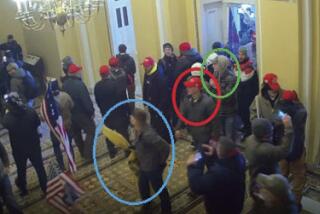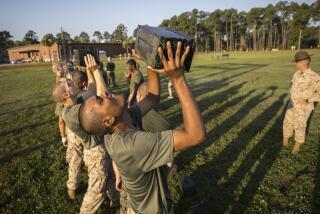Marines need longer span, general says
CAMP FALLOUJA, IRAQ — U.S. Marines fighting in the deserts of western Iraq have a greater need for extra time than extra Marines, the commandant of the Marine Corps said here Tuesday.
“I fear there are two timelines out there,” Gen. James T. Conway told an audience of about 2,500 troops gathered in a base chapel. “One is how long it’s going to take us to do the job. One is how long the country is going to allow us to do the job. And they’re not syncing up.”
Americans should be willing to give the military more time, he said, telling the assembled Marines, sailors and soldiers that “I think if people stop and consider that premature removal could have a disastrous effect and cause us to have to return, I think they would work with us.”
Separately, Conway said in an interview that although he has written “too many” condolence letters and attended many memorials for Marines killed in action here, “vis-a-vis of what Iraq and Afghanistan represent to the country, the casualties are not that great.”
So far in Iraq, 860 active-duty Marines and Marine reservists have been killed, mostly in Al Anbar province in western Iraq, the center of the country’s Sunni Muslim-led insurgency. About 20,000 Marines are deployed in the province. Overall, the U.S. military death toll in the Iraq theater stood Tuesday at 2,980, with 91 American troops killed this month, according to icasualties.org.
Conway, 58, who was commanding general of the 1st Marine Expeditionary Force during the assault on Baghdad in 2003 and the battle with insurgents in Fallouja in April 2004, also said in the interview that based on discussions with Marine field commanders, he did not see a need for a temporary surge of additional Marines into Al Anbar.
Maj. Gen. Richard Zilmer, the top Marine in Iraq, has not presented a specific mission that a surge could accomplish, Conway said. “They could probably use a few more troops, but I do not see a surge in a strict sense in terms of battalions,” he said.
That position is consistent with Conway’s past statements, but it takes on extra significance now as President Bush and Defense Secretary Robert M. Gates near a decision on whether to go ahead with a troop surge, most likely to augment U.S. forces combating the sectarian civil war in and around Baghdad. Bush is expected to announce his new policy in early January.
The U.S. military leadership has been divided on what to do. Some senior generals argue that a surge of American troops would provide the best chance to suppress the violence in Iraq. Others say that additional U.S. forces would discourage Iraqis from taking responsibility for the country’s security.
Conway, along with other members of the Joint Chiefs of Staff, has been skeptical about an increase. In comments this month, Conway said he and other service chiefs “do not believe that just adding numbers for the sake of adding numbers -- just thickening the mix -- is necessarily the way to go.”
Even in the face of a Marine intelligence report that suggests U.S. forces have been unable to maintain control of security in Al Anbar, Conway was upbeat in his appraisal of the situation here.
He pointed to improvements in the Iraqi army and police and support from tribal sheiks in confronting insurgents, particularly in the Qaim region on the border with Syria.
“I’m probably more optimistic about Al Anbar than I have been in a long time,” he said. “I think we’re very near a tipping point.” He added, “I’m very encouraged we will see a twist on this thing in the springtime.”
He said he was bolstered by comments by Bush at a meeting with top-level military commanders two weeks ago. Bush told them, “What I want to hear from you is how we’re going to win, not how we’re going to leave,” Conway said.
Conway’s comments drew some skeptical questions from Marines at the gathering. They quizzed him about the lack of armor for heavy equipment vehicles, whether Marines would be able to stay home longer before returning to Iraq, and the reality of continued mortar fire even at this heavily guarded base.
“Sir, you say things are getting better, but we’re still having mortars land in our living quarters,” one lance corporal told Conway.
The general replied that the camp is much safer than when it opened, but added that even with guards posted around the perimeter, insurgents still find that firing mortars and fleeing is an easy task.
Referring to the perimeter guards, Conway drew cheers by telling the questioning corporal that “those grunts are out there doing the best they can, son.... They would like some help if you would like to help them.”
Conway also said armor has been ordered for equipment and that a more heavily armored vehicle is being developed.
A month ago, the 2,200-troop 15th Marine Expeditionary Unit from Camp Pendleton was redeployed from a Western Pacific training mission into Iraq. Conway said he “would not be surprised” if the unit’s deployment was extended beyond its scheduled March return date.
As the Marines leaned forward to pay close attention, Conway said he hoped to lengthen the deployment schedule so that Marines could remain home for 14 months between seven-month deployments in Iraq.
Speaking of the criminal charges against Marines in the deaths of civilians in Haditha and Hamandiya, Conway said he believed the cases were not part of a wider pattern of misconduct.
He called on troops to show leadership and follow rules meant to protect Iraqi civilians.
“We have to make those tough calls on the battlefield ... so you do not embarrass the country or the Marine Corps,” he said.
More to Read
Sign up for Essential California
The most important California stories and recommendations in your inbox every morning.
You may occasionally receive promotional content from the Los Angeles Times.










